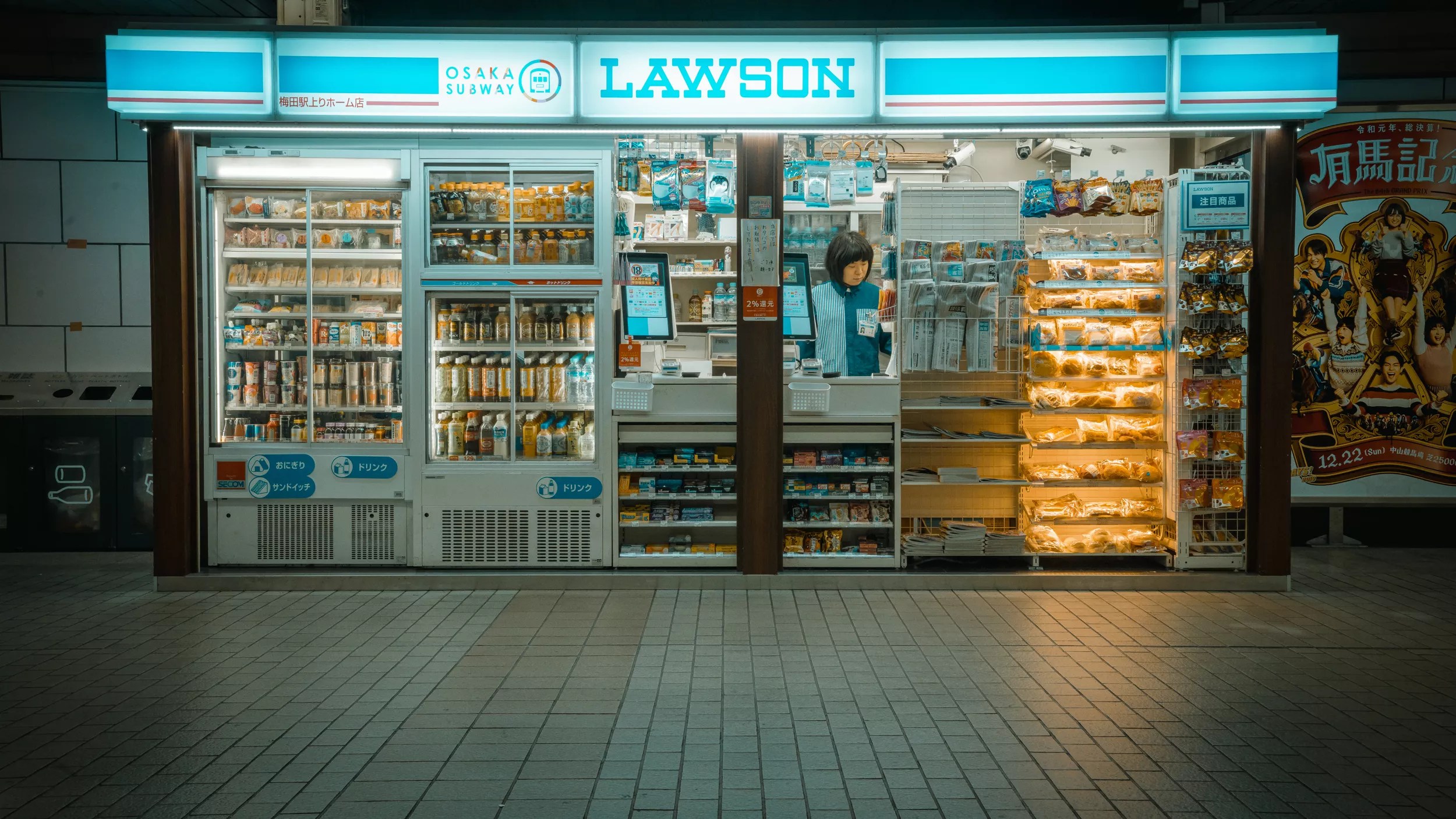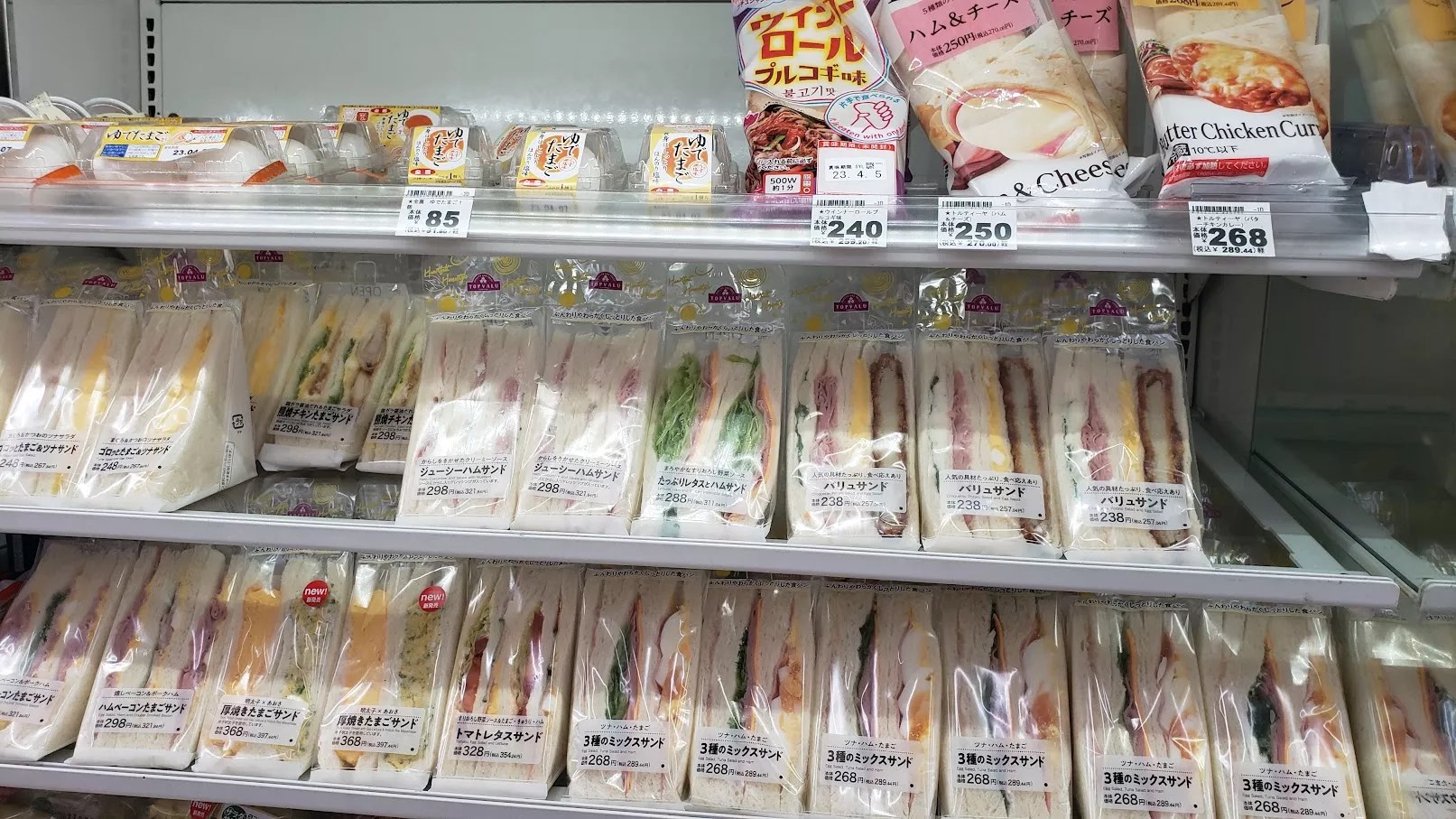
Jeff Fierberg

Audio By Carbonatix
Once upon a time, convenience stores were a purely American invention. But not anymore.
7-Eleven, the world’s largest convenience store chain, has been owned by a Japanese parent company since 2005. Although the well-known brand is the largest chain, with over 71,000 stores worldwide and more than 21,000 in Japan alone, there are a multitude of “konbini” – the Japanese word for convenience stores, a shortened Japanization of “konbee-nee-ense sutoru” – all over that country.
Anyone who travels to Japan is familiar with konbini culture; other well-known chains include Lawson and Family Mart, but there are many more. They’re different – really different – from convenience stores in America, where you might stop for gas if your tank is almost empty, or for an early-morning cup of mediocre coffee. “Oh thank heaven for 7-Eleven” was the slogan for television commercials decades ago, and convenience was always the main selling point, not the quality of the food, snacks or coffee.
In Japan, konbini are an economic hub for all people. They not only offer a wide variety of high-quality groceries, fresh-made meals, snacks and drinks, but also a place to pay your bills, get cash from an ATM, pick up your Amazon Prime packages, and book tickets for concerts, tourist attractions and travel.
Denver, make your New Year’s Resolution Count!
We’re $13,000 away from reaching our $50,000 year-end fundraising goal. Your support could be what pushes us over the top. If our work has kept you informed and connected this year, please consider making a contribution today.
One Denverite fell hard for konbini culture and has found a way to express his appreciation. Jeff Fierberg, creative director for marketing company Sora Studios, has traveled to Japan a handful of times for work. Last summer, he opened Konbini, an immersive exhibit that combines art and food, in the Dairy Block, between Union Station and Sakura Square downtown. Now it has moved into the Source Market Hall, where it will run through the end of March.
“I don’t really remember a time when I wasn’t somehow in love with Japan or the concept of it,” says Fierberg. “I grew up watching anime and samurai movies and [Akira] Kurosawa films. And I always really, really responded to that work far before I ever got to go to Japan.”

A konbini in Japan.
Jeff Fierberg
His first trip, in 2017, introduced him to the variety of konbini, which in turn inspired him to re-create one in the Mile High. “It’s really an interesting place, kind of an epicenter of what that culture looks like,” he says. “You have really beautiful and very cool robotic machines that make smoothies for you. You have fresh fruit that is very high-quality. You have basically everything you need, down to stationery, pens, even underwear” – all the essentials for modern life.
On the walls of Fierberg’s konbini are framed photographs that he’s taken in Japan and the shelves are stocked with items like sake Kit Kats, steak Cheetos, beef braised hot pot Lays potato chips, garlic bread Sun Chips, fig matcha Oreos and a popular drink, Pocari Sweat.
While the company was started in 1939 to sell milk from its founder’s Ohio dairy, there are no more Lawson stores in the U.S. mainland today after the ones that remained were rebranded as Circle Ks. (There are, however, a couple that have recently opened in Hawaii.) But it’s grown to the second-largest konbini chain in Japan, with spin-off businesses that include a dollar-store version and Natural Lawson, which focuses on healthier, natural, organic and gluten-free foods; some also have attached mini-pharmacies.
Fierberg says he prefers Lawson over the others because he thinks the quality of the food, including its bento boxes, onigiri rice balls and sandwiches (like the Tamago Sando, or egg salad sandwich), is better than that of the other chains. (Personally, I prefer the Tamago Sando at 7-Eleven.)
It’s hard to imagine any heated debates on the relative merits of the hot dogs available at American 7-Elevens versus those at Circle K or Kum & Go shops. The prevailing image of convenience-store food in this country is of those dogs all wrinkled and overcooked from hours of rolling on the cookers. While American convenience stores have evolved in recent years following the pandemic-era drops in gasoline sales, they still have a long way to go to compete with Japan.

In Japan, there are debates about which konbini chain makes the best sandwiches.
Gil Asakawa
A convenient history
7-Eleven was founded in 1927 when a Dallas, Texas, manager for the Southland Ice Company realized he could capitalize on the customers who came weekly to buy blocks of ice to use in their pre-refrigeration home ice boxes, and sell them milk and eggs to put in their coolers while they were there.
The manager eventually bought the company under the Southland Corporation banner and opened a chain of shops that were originally named Tote’m Stores (complete with a fake Indigenous totem pole out front). After WWII, the chain was renamed 7-Eleven to advertise its new expanded hours (7 a.m. to 11 p.m., get it?), which made it more convenient for post-war workers, including busy working moms, to get their shopping done before and after work hours.
In the next decades, 7-Eleven expanded into other countries, including Japan. In the U.S., the expansion was helped by the establishment of the national highway system, in large part because the shops teamed up early on with gas companies to provide fuel for cars along with fuel for people.
In Japan, the growth of these stores was boosted by the increase of women in the workplace and the long hours worked by the salary men who often had train commutes that started early in the morning and got them home late at night. Convenience became key. The first Japanese 7-Eleven opened in 1974, and in 1991, Southland in the U.S. had handed control of the stores to its Japanese affiliates Ito-Yokado and Seven-Eleven Japan, which later became Seven & I Holdings. By 2005, 7-Eleven was a subsidiary of the Japanese corporation.
Konbini has an expiration date
After Konbini’s run at the Source, which goes through March 31, Fierberg plans to focus on other creative ventures, including a new gallery show in conjunction with the 2025 Month of Photography.
“This is what I’ve wanted to do for so long that my first goal is literally just that I got to do it,” he says with a satisfied smile. “Like, what a cool, weird thing that I got to do for the city I grew up in – to bring in something that is so deeply meaningful to me. It’s literally a dream come true.”
His hometown is growing and changing quickly, he adds, and “I want to make sure that I can do what I can to elevate experiences that maybe are a little bit outside the norm. I can open some people’s eyes and get them curious about a part of the world that they’re either unfamiliar with or haven’t engaged with before, right? … This is about the interaction with people and bringing those experiences to people and getting to share them,” he concludes.
Konbini is located at 3300 Brighton Boulevard and is open from noon to 5 p.m. Friday, noon to 8 p.m. Saturday, and 11 a.m. to 3 p.m. Sunday through the end of March. For more information, follow @konbini_denver on Instagram.
Editor’s note: This is an updated version of a story that originally ran in July 2023.